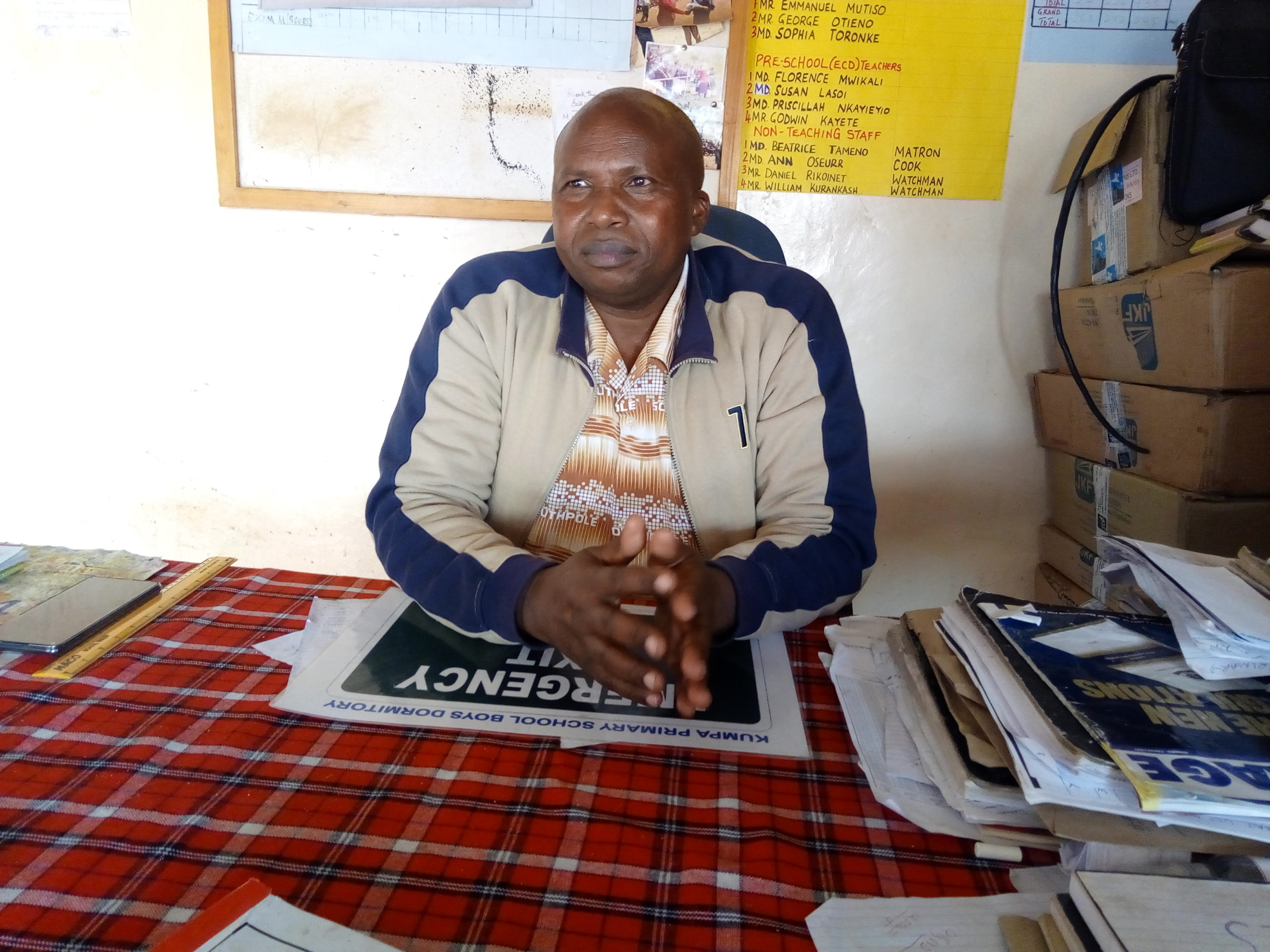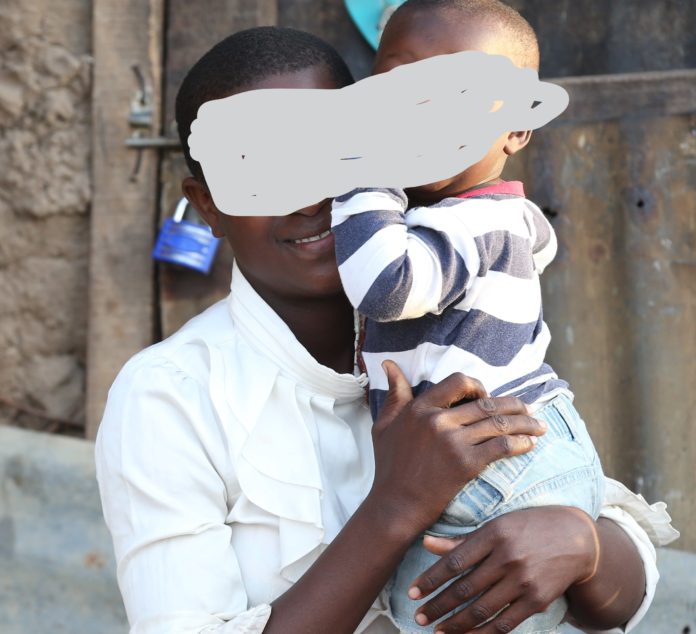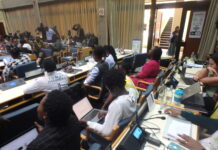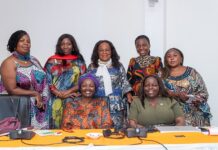By Tebby Otieno
Kajiado County, Kenya: Sitayia Lekenke, is a 34-year-old and a mother of five. It is a hot sunny Thursday afternoon, none of her family members are at her homestead except their family dog that welcomed us.
After a few minutes of waiting, she joins us. She looks exhausted. She had gone to the shores of a river to collect some tomatoes left behind by farmers after a harvest. The young mother hopes to sell what she got at the nearby market, later in the evening, to feed her children.
In addition, she hawks tea on market days as well as selling, Maasai ornaments made from beads. Ms Lekenke does not speak Kiswahili. The area assistant chief, who accompanied us, agreed to do the translation.
“Sometimes I take food to the market and no one buys,” said the soft-spoken, Lekenke.
Ms. Lekenke, does everything within her power, to offer her children the best life she can. Amidst these efforts lies the challenge. Her daughter, who is in form three, is pregnant and soon the size of her family will expand. This, she says, pains her.
“Even before my daughter told me she was pregnant I had already read signs. She used to sleep a lot. So when I finally asked her, she admitted,” she said.
Ms Lekenke has not asked her daughter about the man responsible for the pregnancy. She fears questioning her or even talking about the pregnancy. She thinks this may make her run away from home. She has allowed her to continue with her studies, until such a time that she will deliver.
“I am the one struggling to support my daughter, I do not want her to feel rejected by my family,” said the mother of five.
Lekenke, is one of the tens of mothers within Kajiado county whose teenage daughters have found themselves in the motherhood journey. According to assistant chief, Maureen Maya, in the same neighbourhood, a girl who dropped from school and was later given a second chance to be in school, became pregnant with her second baby and had to run away from home. The girl is now married.
“You see, some of these girls drop out of school again, after becoming pregnant for a second time. For example, when they dropped out while in form two and their parents agree to take care of the babies, by the end of form three, you see she is pregnant again,” said the assistant chief.
According to the area’s assistant chief, illiteracy, poverty and long distance between home and schools are some of the factors that make school girls more vulnerable. For example, from Ms. Lekenke’s homestead to the nearest public school is approximately eight kilometers.

Kumpa Holy Mothers primary school headteacher, Michael Ng’eny, says the school had, 696 learners before COVID-19. The number has since been reduced to 505. He says three girls in this school sat their Kenya Certificate of Primary Education (KCPE) examinations while pregnant.
“We have three girls in class eight from this school who have delivered. There is one who has delivered while in class five. Another one is pregnant and is almost delivering. I had a pupil who passed, KCPE very well, both parents were involved in an accident. We helped her get a scholarship, now she is pregnant,” said Mr. Ng’eny.
The situation is worrying considering that some girls who landed scholarships are also out of school because of teenage pregnancies.
“I also have girls who are being sponsored by a certain madam, and you find they are not concentrating, somehow they forget they are being assisted and when you look at their background, they are extremely poor,” he adds.
Kumpa Holy Mothers Primary School was started with the aim of rescuing children denied their rights to basic education by retrogressive cultural practices. According to the school head, some children come from as far as 17 kilometers. The school has since introduced boarding for class seven and eight pupils.
“Fathers here do not want to speak to girls. There is also a problem with the children themselves. Somebody came to school at night and tried to break into the girls’ dormitory, thank God I reside within the school compound,” he said, explaining that he raised an alarm.
The school has also introduced guidance and counseling where learners are empowered. The head teacher hopes that with time, they will change and discard some retrogressive cultures that affect their education.
The challenges faced by children within Kajiado county- whose parents are mostly pastoralists-were made worse by the tough times brought about by the COVID-19 pandemic. This is according to the assistant chief Maya.
“Because of the COVID-19, most parents lost their businesses and this affected their livelihoods. In the process, sometimes even when girls ask their mothers for sanitary pads, this is not considered a basic,” she said.
A standard packet of the sanitary pad is sold at Ksh50. Out of being desperate, the girls then approach anyone who can agree to either give them this amount or a packet of the pads.
“Without sanitary pads, girls cannot feel comfortable. Most of them run to men who buy for them in exchange for sex. So for lack of sanitary pads, most of them get pregnant,” said assistant chief.
According to her, within her area of jurisdiction, approximately 220 school-going girls have become pregnant since the outbreak of COVID-19 in March 2020. About 10 of them have had second pregnancies. These are girls who are in primary or secondary schools.
“Most of the parents here are illiterate. Due to illiteracy, they don’t see sanitary pads as important in the lives of girls. So girls go looking for them in other ways, which is being a girlfriend to a man who can be buying it for her,” she said.
When classroom learning resumed in the country, after almost a year, due to COVID-19, most girls within this area dropped out of school because of teenage pregnancies. The assistant chief explains that she had to intervene so that parents would agree to take care of the babies to allow their teenage daughters to continue with their education.

“The moment I receive a report that a certain girl is pregnant, I go and talk to both parents to give this girl, second chance to be back in school. I thank God, most of them agreed voluntarily. In other cases, we had to impose the law and they gave their daughters a second chance,” she explained.
The issue of parents neglecting sex talks to chiefs and teachers is also termed as a cultural challenge that exists in the community. Efforts by area leaders to take action against the perpetrators face challenges. Some of the pregnancies are between two minors.
“However, there are cases that are currently in courts of men who took girls from schools and made them their wives. In one case, the girl was rescued and is currently in form one. The mother agreed to stay with the child,” she said.
“You know when you have a case in court then they get prosecuted it helps unlike when this case disappears in the air,”
As a way to bridge the gap created by a culture that has contributed to parents neglecting the sex talk, with their daughters, the assistant chief, organizes meeting with girls during holidays. She uses this opportunity, to teach them about the reproductive health rights.
“I normally reach out to well-wishers, I ask them to support me with sanitary pads. I then call the girls and tell them to come to my home. Sometimes they might even be a hundred. They prepare lunch themselves and we eat together, and have a one on one talk under a tree.”
During these sessions, she also encourages them to work hard in school.
“These girls have sex in the bushes around here. Some use their parents’ phones to communicate and since their parents are illiterate, they do not read the short messages that invite these men to their parents’ houses when they are not around,” she said.
The government through education Cabinet Secretary, Prof. George Magoha asked parents and teachers to allow learners who conceived to continue with their education, a call most parents like Sitayia Lekenke, have welcomed.
“When my daughter delivers, I will ask her to stay at home for about a year to take care of her baby then she can go back to school thereafter,” said Ms Lekenke.














